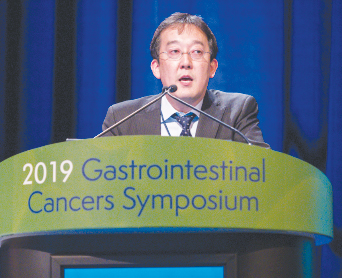
Takashi Kojima, MD
In the global phase III KEYNOTE-181 trial, pembrolizumab as second-line therapy for advanced esophageal cancer did not improve overall survival in the whole population, vs chemotherapy, but did improve survival for patients with strong expression of programmed cell death ligand 1 (PD-L1), according to Takashi Kojima, MD, of the National Cancer Center Hospital East in Kashiwa, Japan.
Patients with a PD-L1 combined positive score (CPS) ≥ 10, which accounted for about 35% of the study population, had a median overall survival of 9.3 months with pembrolizumab vs 6.7 months with chemotherapy (hazard ratio [HR] = 0.69, P = .0074). The 12-month survival rate in this group was 43% vs 20%, respectively, Dr. Kojima reported at the 2019 Gastrointestinal Cancers Symposium.1
“These data support pembrolizumab as a new second-line standard of care for esophageal cancers with PD-L1 CPS ≥ 10,” Dr. Kojima said. The findings mark the first time that a programmed cell death protein 1 inhibitor has demonstrated an improvement in survival in advanced esophageal cancer, the researchers noted.
KEYNOTE-181
Following the phase II KEYNOTE-180 trial2—which demonstrated durable responses in tumors that were squamous cell carcinoma, adenocarcinoma, or had a PD-L1 CPS ≥ 10—the KEYNOTE-181 study evaluated pembrolizumab vs investigator’s choice of chemotherapy as second-line therapy for patients with advanced or metastatic squamous cell carcinoma and adenocarcinoma of the esophagus or Siewert type I adenocarcinoma of the esophagogastric junction. Two-thirds of the population had squamous cell carcinoma and one-third had adenocarcinoma.
These data support pembrolizumab as a new second-line standard of care for esophageal cancers with PD-L1 CPS ≥ 10.— Takashi Kojima, MD
Tweet this quote
The 628 patients were randomly assigned to receive pembrolizumab at 200 mg every 3 weeks for up to 2 years or investigator’s choice of paclitaxel, docetaxel, or irinotecan. Randomization was stratified by histology (squamous cell carcinoma vs adenocarcinoma) and region (Asia vs rest of the world). The three co-primary endpoints were overall survival in the intent-to-treat population, the squamous cell carcinoma subgroup (n = 401), and the subgroup with a CPS ≥ 10 (n = 222). The boundary for statistical significance in the squamous cell carcinoma and intent-to-treat subgroups was P ≤ .0077; the boundary for the CPS ≥ 10 subgroup was P ≤ .0085. The median follow-up was approximately 7 months.
Benefit Confined to PD-L1 CPS ≥ 10 Subgroup
Although pembrolizumab was of significant benefit in patients with a PD-L1 CPS ≥ 10, it did not improve overall survival or progression-free survival in the overall intent-to-treat population. A trend was observed favoring pembrolizumab in patients with squamous cell carcinoma, Dr. Kojima reported. “We saw a clinically meaningful increase in overall survival in patients with squamous cell carcinoma but similar overall survival in the intent-to-treat population,” he said.
In the intent-to-treat analysis, median overall survival was 7.1 months in each arm (HR = 0.89, P = .0560). Survival rates were 32% with pembrolizumab and 24% with chemotherapy at 12 months, and 18% and 10%, respectively, at 24 months.

Takashi Kojima, MD, presented results of the phase III KEYNOTE-181 trial at the 2019 Gastrointestinal Cancers Symposium. Photo by © ASCO/Todd Buchanan 2019.
In the squamous cell carcinoma subgroup, median overall survival was 8.2 months vs 7.1 months (HR = 0.78, P = .0095), respectively, with survival rates of 39% with pembrolizumab and 25% with chemotherapy at 12 months, and 23% vs 12%, respectively, at 24 months. These differences favoring pembrolizumab did not meet the study’s prespecified statistical boundary of P ≤ .0075.
At 12 months, progression-free survival rate was 21% vs 7% for pembrolizumab and chemotherapy, respectively, in the PD-L1 CPS ≥ 10 group; 15% vs 9% in the squamous cell carcinoma group; and 12% and 10% in the intent-to-treat group.
PEMBROLIZUMAB IN ADVANCED ESOPHAGEAL CANCER
- The phase III KEYNOTE-181 trial evaluated pembrolizumab vs chemotherapy as second-line treatment in 628 patients with advanced esophageal cancer.
- The primary endpoint of improvement in overall survival was not met in the intent-to-treat and esophageal squamous cell carcinoma populations.
- Pembrolizumab did improve survival, vs chemotherapy, in patients with PD-L1 CPS ≥ 10. In this group, median overall survival was 9.3 months with pembrolizumab vs 6.7 months with chemotherapy (HR = 0.69; P = .0074), meeting its primary endpoint in this group.
Response rates with pembrolizumab were double or triple those achieved with chemotherapy for all 3 comparisons, though the median duration of response was only longer in the PD-L1 CPS ≥ 10 group (9.3 vs 7.7 months with chemotherapy).
With pembrolizumab, fewer patients had drug-related adverse events of any grade (64% vs 86%) or grade 3 to 5 (18% vs 41%), compared with chemotherapy. The most common events with pembrolizumab were fatigue (11.8%), hypothyroidism (10.5%), decreased appetite (8.6%), asthenia (7.0%), nausea (7.0%), and diarrhea (5.4%). Five treatment-related deaths occurred in each group.
The phase III KEYNOTE-590 study (ClinicalTrials.gov identifier NCT03189719) of pembrolizumab plus chemotherapy as first-line therapy for patients with locally advanced or metastatic esophageal carcinoma is ongoing. ■
DISCLOSURE: Dr. Kojima has received honoraria from Oncolys BioPharma and institutional research funding from Ono Pharmaceutical, Merck Sharp & Dohme, Shionogi, Oncolys BioPharma, and Astellas Amgen BioPharma.
REFERENCES
1. Kojima T, Muro K, Francois E, et al: Pembrolizumab versus chemotherapy as second-line therapy for advanced esophageal cancer: The phase 3 KEYNOTE-181 study. 2019 Gastrointestinal Cancers Symposium. Abstract 2. Presented January 17, 2019.


